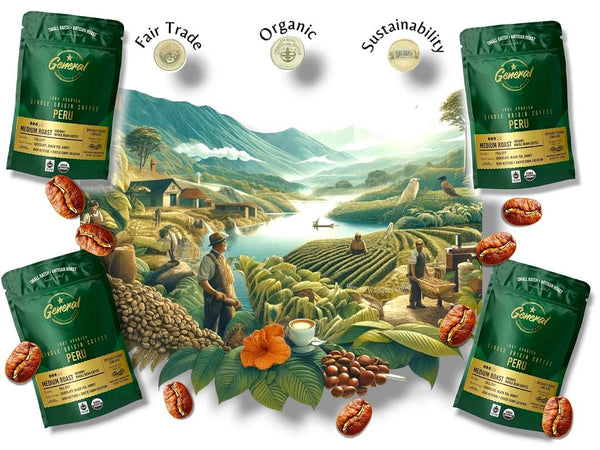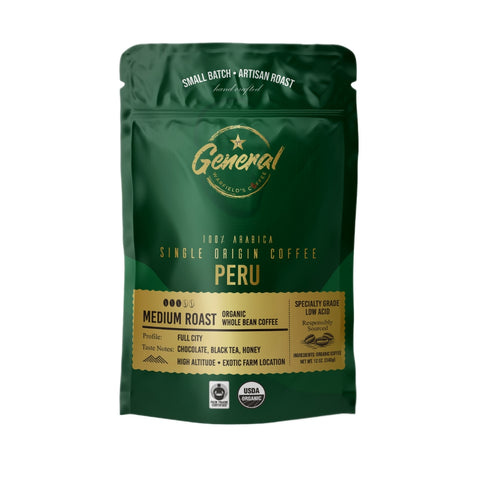Is Peruvian Coffee from Cusco the Best?
Introduction

Imagine sipping a cup of coffee so exquisite that it transports you to the ancient, mist-covered mountains of Cusco, Peru. Known for its rich history and Incan ruins, this enchanting region also produces some of the finest coffee in the world. The secret? High-altitude cultivation, nutrient-rich volcanic soil, and centuries-old farming traditions. Welcome to Cusco’s coffee perfection.
In this article, we delve into the secrets behind Cusco, Peru's finest brew. From the terraced mountainsides where coffee plants thrive to the meticulous processing methods passed down through generations, every step in producing this liquid gold is steeped in tradition and expertise.
Cusco's unique microclimate, with its ample rainfall and cool temperatures, creates ideal conditions for coffee cultivation. The beans grown here boast a distinct flavor profile that captures the essence of this mystical land and are considered among the best in the world.
From the first sip, you'll be transported to the ancient streets of Cusco, as notes of chocolate, citrus, and flowers dance across your palate. But what truly sets Cusco's coffee apart is the commitment to sustainability and fair trade practices. With every cup, you can savor unparalleled taste while supporting ethical and environmentally sound coffee production.
Join us on a journey to uncover the secrets behind Cusco, Peru's finest brew and indulge in a sensory experience like no other. By the end, you might just agree that Peruvian coffee from Cusco is indeed the best.
The History of Coffee in Cusco, Peru

Cusco's love affair with coffee dates back centuries, intertwining with the region's rich cultural heritage. Introduced by Spanish colonists in the mid-18th century (around the year 1740), coffee quickly found a new home in the fertile soils of Cusco.
As coffee production techniques evolved over time, Cusco's reputation for exceptional coffee grew, attracting coffee enthusiasts from around the globe eager to savor the unique flavors of this region. Today, Cusco stands as a beacon of excellence in the world of specialty coffee, with its beans coveted by connoisseurs and baristas alike.
Exploring the historical roots of coffee in Cusco unveils a story of resilience, passion, and dedication to preserving age-old traditions. The journey from seed to cup is a testament to the deep-seated cultural significance that coffee holds in the hearts of the people of Cusco.
What are the Unique Coffee Growing Conditions in Cusco?

The unparalleled quality of Cusco's coffee can be attributed to its unique growing conditions. Cusco's coffee plants are nurtured by a combination of factors that make this region a coffee paradise. Situated at high altitudes, typically between 1,200 to 2,000 meters (3,937 to 6,562 feet) above sea level, the coffee farms benefit from cool temperatures that slow down the ripening process of the beans.
Higher altitude results in denser cherries and more complex flavor development. The mountainous terrain also provides natural shade, protecting the delicate coffee plants from harsh sunlight and ensuring a gradual maturation of the cherries. Additionally, the terraced mountainsides offer the necessary soil drainage, resulting in beans that are rich in flavor and complexity.
These growing conditions, combined with abundant rainfall during the wet season from November to March, provide the perfect hydration for the coffee plants. This harmony of altitude, climate, and soil composition creates dense, flavorful, and aromatic beans.
Furthermore, the traditional farming practices employed in Cusco prioritize sustainability and environmental stewardship. Farmers in Cusco have embraced organic farming methods, eschewing synthetic chemicals in favor of natural fertilizers and pest control techniques. This commitment to sustainable agriculture not only preserves the integrity of the land but also enhances the quality and purity of the coffee produced in Cusco.
What Varieties of Coffee are Grown in Cusco?

Cusco's diverse coffee varieties contribute to its global acclaim. Cusco boasts a diverse array of coffee varieties, each with its own unique characteristics and flavor profiles. Among the most prominent varieties cultivated in the region are Typica, Bourbon, and Caturra.
Typica, renowned for its balanced acidity and sweet notes, thrives in the high altitudes of Cusco, developing a nuanced flavor profile influenced by the region's terroir. Bourbon is prized for its rich body and caramel-like sweetness, making it a favorite among coffee aficionados seeking a decadent cup.
Caturra, a dwarf mutation of Bourbon, is prized for its vibrant acidity and citrus undertones, adding a zesty twist to Cusco's coffee offerings. In addition to these classics, Cusco is experimenting with rare and exotic cultivars such as Geisha and Pacamara. These innovative approaches have garnered international acclaim, positioning Cusco as a pioneer in the exploration of new coffee experiences.
The meticulous selection and cultivation of these coffee varieties reflect the dedication of Cusco's farmers to producing exceptional beans that embody the essence of this remarkable region. Each variety tells a story of craftsmanship and passion, culminating in a sensory journey that encapsulates the unique terroir of Cusco.
The Coffee Production Process in Cusco

The journey from seed to cup in Cusco is a testament to meticulous craftsmanship. The journey of Cusco's coffee beans from the farm to your cup is a meticulous process that involves multiple steps, each crucial in preserving the beans' quality and flavor.
It all begins with the careful selection of ripe coffee cherries, which are handpicked by skilled farmers to ensure only the finest beans make it to the next stage. The cherries are then pulped to remove the outer skin, revealing the precious coffee beans inside.
After pulping, the cherries undergo a series of processing methods, including washing, fermentation, and drying, to remove the outer layers and reveal the prized coffee beans. The washed process, favored for its clean and bright flavors, involves soaking the cherries in water to separate the beans from the pulp. Alternatively, the natural process, where the cherries are dried with the fruit intact, imparts unique flavors.
Once dried, the beans are sorted and graded based on size, density, and quality. This meticulous sorting ensures that only the best beans reach the roasting stage, where green coffee beans are transformed into aromatic, flavorful beans. The art of roasting requires experience and expertise, as the roaster must carefully monitor temperature and time to bring out the beans' optimal flavors.
The Art of Coffee Roasting in Cusco

Roasting is where the magic of Cusco's coffee truly comes to life. In Cusco, coffee roasting is an art form that requires precision and finesse. The roasters in Cusco take pride in their craft, using traditional methods to coax out the unique flavors of the region's coffee beans.
The roasting process begins with green coffee beans (unroasted, raw seeds of the coffee cherry) that are carefully measured and loaded into the roaster, where they are subjected to controlled heat and airflow. As the beans roast, they undergo a series of chemical reactions that transform their flavor profile.
The roasters monitor the beans closely, using their senses of sight, smell, and sound to determine when the beans have reached the perfect roast level. The timing of the roast is crucial, as even a few seconds can make a significant difference in the beans' flavor.
Cusco's coffee roasters are known for their attention to detail and commitment to quality. Each batch of coffee is roasted with care and precision, ensuring that the beans' unique characteristics are preserved. The result is a cup of coffee that is rich, flavorful, and balanced, a testament to the roasters' skill and expertise.
What are the Tasting and Flavor Profiles of Coffee from Cusco?

Tasting Cusco's coffee is an experience that engages all the senses. The true beauty of Cusco's coffee lies in its diverse flavor profiles, each telling a unique story of the region's terroir and craftsmanship. When you take your first sip of Cusco's coffee, you are greeted with a symphony of flavors that dance across your palate.
Notes of chocolate, citrus, and flowers blend harmoniously, creating a sensory experience like no other. The coffee's aroma is equally enchanting, with hints of caramel, nuts, and spices that linger in the air.
Cusco's coffee offers a complex and nuanced taste that evolves with each sip. The initial brightness gives way to a smooth, velvety texture that coats the tongue, leaving a lingering sweetness on the finish. The balance of acidity and sweetness is a hallmark of Cusco's coffee, a testament to the region's unique growing conditions and meticulous production methods.
Coffee tasting in Cusco is an experience that engages all the senses, from the aroma of freshly ground beans to the complex flavors that unfold in the cup. Each coffee bean tells a story of the land it was grown on, the hands that cultivated it, and the passion that went into its production. In Cusco, coffee isn't just a beverage; it is a work of art that invites you to savor every moment.
Sustainable and Fair Trade Practices in Cusco's Coffee Industry

Sustainability and fair trade are cornerstones of Cusco's coffee industry. Cusco's coffee industry is committed to sustainability and ethical practices, ensuring that the region's coffee production is both environmentally sound and socially responsible. Many coffee farms in Cusco are certified organic, using natural farming methods to protect the land and waterways.
The farmers work in harmony with nature, implementing practices such as composting and crop rotation to maintain soil fertility and biodiversity. In addition to sustainability, Cusco's coffee industry places a strong emphasis on fair trade practices, ensuring that farmers receive a fair price for their crops.
Fair trade certification guarantees that farmers are paid a living wage and have access to resources that improve their livelihoods. By supporting fair trade coffee, consumers can contribute to the well-being of coffee farming communities in Cusco and beyond.
The commitment to sustainability and fair trade in Cusco's coffee industry extends beyond the farm to the entire supply chain. Local cooperatives and exporters play a vital role in ensuring that coffee produced in Cusco reaches global markets ethically and responsibly. When you choose Cusco's coffee, you are not just enjoying a delicious cup; you are supporting a sustainable and equitable coffee industry that values both people and the planet.
Where Can I Find the Best Coffee from Cusco?

Exploring the vibrant streets of Cusco, you will find a bustling coffee scene that celebrates the region's rich coffee culture. From cozy cafes nestled in historic buildings to trendy roasteries showcasing the latest brewing techniques, Cusco offers a diverse array of coffee shops to satisfy every coffee lover's cravings. Whether you are in search of a classic espresso or a specialty pour-over, Cusco's coffee shops have something for everyone.
One of the must-visit coffee spots in Cusco is the iconic Cafe Daria, known for its artisanal coffee blends and cozy atmosphere. Situated in the heart of the city, Cafe Daria is a favorite among locals and tourists alike, offering a menu of single-origin coffees and delectable pastries. Another gem in Cusco's coffee scene is Qantu Coffee Lab, a modern coffee shop that showcases the best of Peruvian coffee through innovative brewing methods and tasting experiences.
For a taste of Cusco's traditional coffee culture, head to Cafe Ayllu, a charming cafe that serves up classic Peruvian brews in a relaxed setting. The cafe's friendly baristas are passionate about sharing the story behind each cup of coffee, making it a must-visit destination for coffee enthusiasts.
In addition to these local treasures, General Warfield’s Coffee offers Fair-Trade and USDA Organic certified Single-Origin Peruvian whole bean coffee. Available for purchase online, this exquisite coffee allows you to experience the rich, nuanced flavors of Cusco from the comfort of your home. Each bag supports sustainable farming practices and fair wages for local farmers, making every cup a meaningful choice.
Discover the rich, nuanced flavors of Cusco's finest coffee with General Warfield’s Fair-Trade and USDA Organic certified Single-Origin Peruvian whole bean coffee. Experience the perfect blend of tradition and innovation in every cup. Order now and support sustainable farming practices while enjoying a truly exceptional coffee.
Click Image Below!
Whether you are looking for a quick caffeine fix or a leisurely coffee tasting experience, Cusco's coffee shops offer a warm welcome and a delicious cup of coffee to savor. And for those who want to bring a piece of Cusco's coffee culture home, General Warfield’s Peruvian coffee is an exceptional option.
Conclusion: Is Peruvian Coffee from Cusco the Best?

In the enchanting landscapes of Cusco, Peru, a hidden treasure awaits those who seek the perfect cup of coffee. From the lush mountainsides where the coffee plants thrive to the hands that carefully cultivate and roast the beans, every step in the production of Cusco's coffee is a labor of love.
Sipping a cup of Cusco's coffee is a sensory journey that captures the essence of this mystical land, with flavors of chocolate, citrus, and flowers dancing across your palate. With a commitment to sustainability and fair trade practices, Cusco's coffee industry not only produces exceptional coffee but also supports a better future for coffee farming communities and the environment.
So, is Peruvian coffee from Cusco the best? The unparalleled quality, unique growing conditions, diverse flavor profiles, and dedication to sustainable practices certainly make a strong case for it. If you find yourself in Cusco, be sure to indulge in the perfection of its coffee. Visit local coffee shops, meet passionate farmers and roasters, and experience firsthand the magic of Cusco's finest brew. Let each sip transport you to where tradition meets innovation, and history meets the future. In Cusco, every cup of coffee is a work of art waiting to be savored.
Ready to bring the magic of Cusco's coffee to your home?
Discover the rich, nuanced flavors of General Warfield’s Fair-Trade and USDA Organic certified Single-Origin Peruvian whole bean coffee. Experience the perfect blend of tradition and innovation in every cup.
Order now and support sustainable farming practices while enjoying a truly exceptional coffee.





Leave a comment